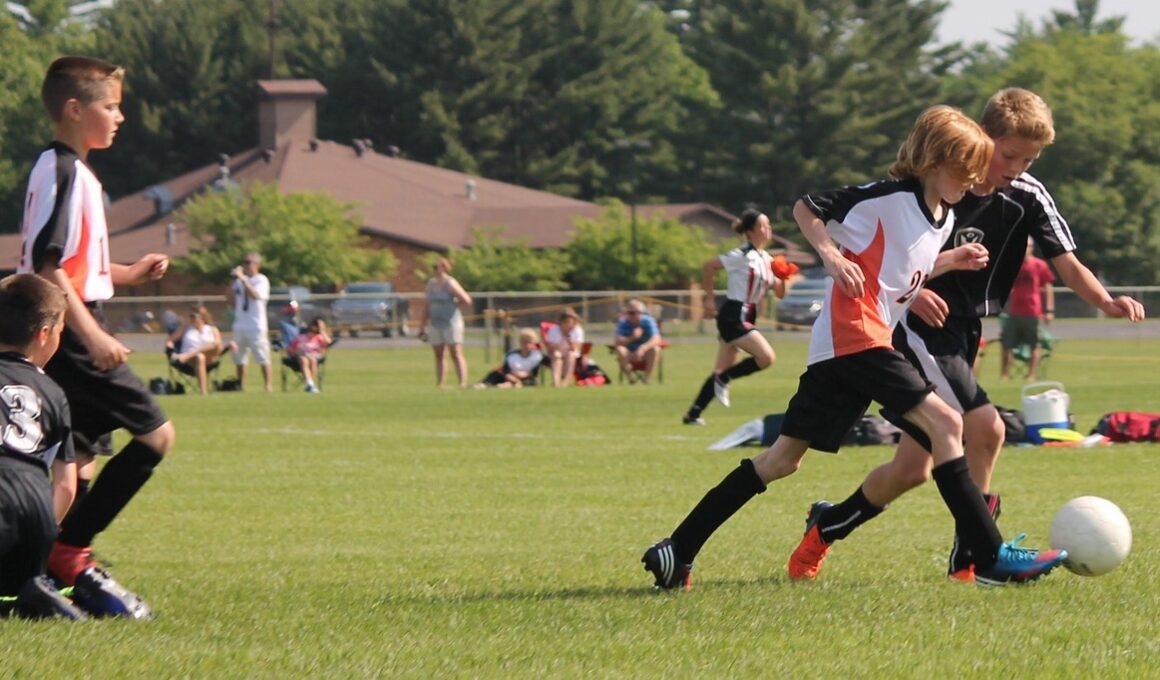Recovery Techniques for Young Football Athletes
Recovery is crucial for the performance and well-being of young football athletes. It contributes significantly to a player’s ability to perform consistently and reduce the risk of injury. Young athletes often encounter physical and mental fatigue due to intense training and competitive matches. Hence, incorporating effective recovery techniques is essential. Common recovery methods include hydration, nutrition, rest, and targeted stretching. Maintaining proper hydration helps replace lost fluids during exercises, while balanced nutrition speeds recovery processes. Young athletes must consume an adequate amount of carbohydrates and proteins. Adequate sleep is vital for recovery, as it restores energy and promotes muscle repair. Furthermore, active recovery strategies involving light exercises aid in muscle recovery and circulation. Incorporating foam rolling or gentle yoga can alleviate muscle tightness and promote flexibility. Engaging with coaches and trainers about individualized recovery plans is also advisable. Parents should encourage their children to prioritize recovery as it impacts future performance. By implementing these techniques, young athletes will be better equipped to handle the physical demands of football and achieve their full potential on the field.
Recovery techniques extend beyond physical methods; mental recovery is equally significant. Stress management helps young athletes cope with pressures from competition and training schedules. Techniques such as meditation and mindfulness can foster mental resilience, leading to improved performance. Additionally, allowing players to take days off from training without feelings of guilt influences their recovery positively. Regular mental breaks or relaxation exercises can significantly sterilize intense emotions experienced post-game or practice. Furthermore, involving young athletes in discussions about their mental health and recovery strategies is crucial. Parents and coaches should emphasize a supportive environment where players can express their feelings. A focus on fun and engagement in training settings can alleviate performance anxieties. This approach leads to a more well-rounded football experience. Exposure to different sports or activities during the off-season can also be beneficial. It gives young athletes a mental break while maintaining physical functionality. Overall, comprehensive recovery plans merge physical and mental strategies, providing young athletes with a solid foundation for future success. This holistic approach fosters a positive sporting experience and encourages lifelong healthy habits.
Nutrition’s Role in Recovery
Nutrition plays a critical role in the recovery process for young athletes. Sports nutrition should not be neglected, as it directly impacts energy levels and recovery rates. Consuming the right foods helps restore glycogen levels and facilitate muscle repair after intense competition or training sessions. Incorporating a diet rich in carbohydrates post-exercise replenishes energy stores, while protein intake supports muscle recovery and growth. Young athletes should also focus on antioxidants found in fruits and vegetables, which combat oxidative stress induced by strenuous physical activity. Regular meals and snacks contribute to maintaining energy balance ensuring young athletes are prepared for their next sessions. It’s essential to encourage young athletes to develop healthy eating habits early on, as it lays the foundation for future performance. Hydration remains a fundamental aspect, as water loss during exercise must be replaced to support recovery. Young athletes must understand the importance of balanced meals and hydration pre- and post-training. Proper nutrition and hydration can lead to improved performance, faster recovery, and long-term health benefits. By emphasizing nutrition in recovery, coaches and parents can cultivate healthier athletes who thrive in their sporting endeavors.
Stretching is a pivotal recovery technique that benefits young football athletes. Pre-and post-training stretching sessions assist with flexibility, improve range of motion, and alleviate muscle soreness. Dynamic stretching before workouts prepares muscles for exertion, while static stretching post-activity helps maintain muscle flexibility. Teaching appropriate stretching routines can enhance overall athletic performance and reduce the risk of injury. Furthermore, integrating mobility exercises into regular training can facilitate better recovery outcomes. Young athletes should be guided on incorporating stretches into their daily routine for long-lasting benefits. Coaches can design warm-up and cool-down sessions that focus on key muscle groups utilized during football. Engaging in consistent stretching practices contributes significantly to muscle recovery and relaxation. Educating young athletes about the importance of stretching helps establish a culture of self-care. Moreover, pilates and yoga can enhance flexibility and core strength, contributing to improved athletic performance. Through dedicated stretching techniques, young athletes become more resilient on the field. Overall, maintaining a well-rounded approach to recovery, which includes stretching, is key to sustaining an athlete’s physical health and enhancing performance during competitions and training sessions.
The Importance of Sleep
Sleep is one of the most underestimated aspects of recovery for young athletes. Adequate sleep is essential for physical and mental restoration, affecting overall performance levels. Young football athletes typically require more sleep than adults due to their growing bodies and demanding training schedules. Lack of sleep leads to decreased concentration, slower reaction times, and increased susceptibility to injuries. Establishing sleep routines that facilitate restful sleep can enhance recovery significantly. Limiting screen time before bed, maintaining a quiet sleep environment, and going to bed at consistent times are practical strategies. Napping during the day, when suitable, may also provide anyone with additional recovery benefits. Young athletes should be educated on the detrimental effects of late-night activities that interfere with rest. Emphasizing sleep hygiene as part of their training can lead to improved adherence to recovery strategies. Coaches and parents can encourage an environment where sleep is prioritized, emphasizing its significance in achieving higher performance levels. Thus, fostering good sleep habits throughout their football journey ensures that young athletes are performing at their peak, mentally alert and physically prepared for the day’s challenges on the field.
Mindfulness and relaxation techniques can also enhance recovery for young football athletes. Practicing mindfulness helps young players manage anxiety and stress related to competition and performance. Techniques such as structured breathing, visualization, and body scans can encourage a focused mindset. Integrating these practices into team routines can help athletes build emotional resilience over time. Creating a culture that values mental well-being encourages athletes to address challenges positively. Additionally, relaxation exercises can assist in calming the body and improving recovery rates. Simple practices like deep breathing can reduce heart rates and promote relaxation post-game or training. Coaches and parents should actively promote mindfulness and relaxation strategies to ensure young athletes cultivate a balanced approach to their sport. This balance ensures sustainable engagement in football without succumbing to the pressures of competition. By making time for mental recovery within physical training, athletes develop a deeper connection with their sport and improve their performance. Overall, integrating mindfulness within recovery can transform how these young players experience football, leading to more enriching experiences on their journey.
Balancing Competition and Recovery
Finding balance between competition demands and effective recovery is vital for young athletes. Organizing a well-structured training schedule that allows adequate recovery time ensures athletes remain healthy and ready for competition. Coaches should be aware of each player’s individual recovery needs and adjust training loads accordingly. Implementing periods of lower-intensity training can help athletes recover while still staying engaged in football. Parents should encourage their children to communicate openly about their fatigue and recovery needs. Recognizing when to push or hold back is crucial for long-term development. Healthy communication fosters an environment where young athletes feel supported in their training endeavors. Creating recovery-focused team events, such as light training days or community activities, balances intense competition with enjoyable experiences. Emphasizing the importance of taking breaks for proper recovery enhances overall engagement in sport. Parents and coaches can model these principles by taking care of their own well-being and emphasizing a healthy approach. This leads to sustainable performance improvements and enriched team dynamics. Promoting a culture recognizing effort alongside essential recovery practices encourages young athletes to cherish the game they love. Such a culture will lead to healthier and more resilient football players.
In summary, effective recovery techniques are essential for optimizing the performance of young football athletes. Emphasizing strategies such as proper nutrition, stretching, sleep, and mental well-being forms the foundation for athlete development. Coaches, parents, and young athletes must collaboratively establish a recovery framework that is both supportive and effective. Through deliberate practices that prioritize health, future athletes will thrive physically and mentally. Recognizing the importance of recovery empowers young players to take charge of their own health. Engaging in regular conversations around recovery helps reinforce its importance as part of training regimes. More importantly, fostering a fun and enjoyable environment can lead to lifelong passion for football. By embracing a holistic approach to recovery, young athletes will be adequately prepared for the challenges of their sport. Encouraging healthier habits influences overall well-being, translating to both on-field performance and life skills. In the long term, investing in recovery practices will lead to a generation of healthier, happier athletes who appreciate football and understand the significance of maintaining their bodies. In conclusion, committed recovery practices are pivotal for ensuring young football athletes achieve their fullest potential.


